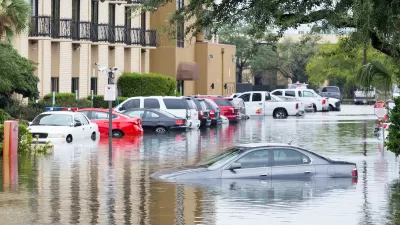Climate change has become a focal point of urban planning in the U.S. and abroad as cities grapple with so-called sustainability. I’ve been a critic of many attempts to implement sustainability plans, not so much because I disagree with the intent as much as I believe the tools used to achieve sustainability are not particularly effective.
Climate change has become a focal point of urban planning in the U.S. and abroad as cities grapple with so-called sustainability. I've been a critic of many attempts to implement sustainability plans, not so much because I disagree with the intent as much as I believe the tools used to achieve sustainability are not particularly effective. They also tend to dismiss or neglect the fundamental role prices and market-based approaches will address many of these problems (as my article in Town Planning Review also points out).
So, when I heard UCLA economist Matthew Kahn's book, Climatopolis: How Are Cities Will Thrive in the Hotter Future, was out, I was curious about how a market-oriented approach might be used to frame urban policy toward climate change. Kahn's book is eminently readable and accessible to non-economists, written in a breezy, conversational style. The tone might be a bit light for many academics, but Kahn nonetheless effectively provides a fresh view of how cities will need to cope with rising temperatures. In addition, he explicitly addresses planning (particularly planning informed by scenario analysis) and its role in identifying relevant climate change adaptation and coping strategies.
Climate change skeptics will likely be disappointed because Kahn takes as given that global warming is occurring: it's coming and there's little we can do about it. The question, for Kahn, is what cities can do about it, if anything. I think the question motivating Kahn's book is the right one and gets us to another level in the discussion. (For the record, I also accept the conventional scientific wisdom that global temperatures are likely to rise over the next century despite the lack of significant warming over the last ten years.)
Unfortunately, planners might be inclined to dismiss Kahn's work believing at first blush his book is too late to the show: After all, aren't most cities now engaged in sustainability planning? Neglecting Kahn's book would be a mistake. I believe the core insight of his analysis is to show how the competitive position of cities will fundamentally change with global warming. Geography matters; it will matter a lot more in a warmer world than in the current cooler one. Hello Salt Lake City and Fargo, North Dakota; Good-bye Los Angeles and New York City.
Of course, it's not that simple, and Kahn does an admirable job of delving into the complexity of how changes in local climates will influence the relative competitive position cities and regions. Indeed, New York will likely survive, but it will have to invest substantially in coping and adaptation strategies. Fargo, on the other hand, will largely have to deal with new growth with relatively few adaptation strategies because it is well positioned to take advantage of the benefits of a more temperate climate.
What Kahn emphasizes in Climatopolis is that climate change policy (and sustainability for that matter) may not about universal or global policy strategies (although he favors adding a dollar or two to the gas tax). Too many cities are focused on general goals such as reducing overall carbon emissions and not enough on coping strategies, investments in adaptation, and planning (including zoning) that will be essential for their survival.
For Kahn, dealing with climate change is essentially about trade-offs and city-specific policies focused on adaptation, not global strategies that have little potential for being effective. How cities address these trade-offs will be a key to their ability to compete. For this reason alone, Climatopolis deserves to be on the book shelf, in the kindle, or on the iPad of urban planners.

Planetizen Federal Action Tracker
A weekly monitor of how Trump’s orders and actions are impacting planners and planning in America.

Restaurant Patios Were a Pandemic Win — Why Were They so Hard to Keep?
Social distancing requirements and changes in travel patterns prompted cities to pilot new uses for street and sidewalk space. Then it got complicated.

Map: Where Senate Republicans Want to Sell Your Public Lands
For public land advocates, the Senate Republicans’ proposal to sell millions of acres of public land in the West is “the biggest fight of their careers.”

Maui's Vacation Rental Debate Turns Ugly
Verbal attacks, misinformation campaigns and fistfights plague a high-stakes debate to convert thousands of vacation rentals into long-term housing.

San Francisco Suspends Traffic Calming Amidst Record Deaths
Citing “a challenging fiscal landscape,” the city will cease the program on the heels of 42 traffic deaths, including 24 pedestrians.

California Homeless Arrests, Citations Spike After Ruling
An investigation reveals that anti-homeless actions increased up to 500% after Grants Pass v. Johnson — even in cities claiming no policy change.
Urban Design for Planners 1: Software Tools
This six-course series explores essential urban design concepts using open source software and equips planners with the tools they need to participate fully in the urban design process.
Planning for Universal Design
Learn the tools for implementing Universal Design in planning regulations.
Heyer Gruel & Associates PA
JM Goldson LLC
Custer County Colorado
City of Camden Redevelopment Agency
City of Astoria
Transportation Research & Education Center (TREC) at Portland State University
Camden Redevelopment Agency
City of Claremont
Municipality of Princeton (NJ)






























